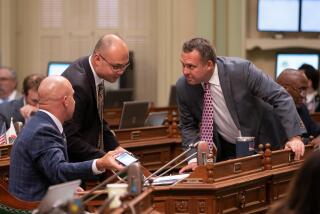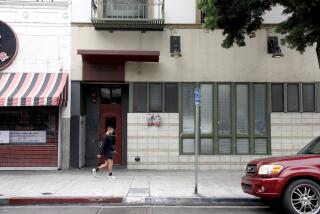Audit Details Bradley Role in Land Deal
- Share via
Mayor Tom Bradley assumed a more active role in helping a campaign fund-raiser obtain vacant city land than he has previously acknowledged, an audit of the city’s real estate department disclosed Tuesday.
In the past, the mayor has said that he only asked city bureaucrats for “the status” of the proposed sale of two city-owned parcels to Allen E. Alevy.
But the audit report by the city administrative office states that the mayor called a senior real estate official asking whether one of the vacant lots could be sold directly to Alevy, effectively bypassing a public auction.
Although that deal was eventually blocked by the administrative office, Alevy had earlier acquired a neighboring city property without competitive bidding with help from Bradley ally Councilman Gilbert Lindsay.
The audit did not allege any wrongdoing by the mayor or real estate officials, but did call for tighter restrictions on the sale of surplus city land without public auction. The mayor has said that he did no more for Alevy, a Long Beach businessman, than he does for his constituents.
Information uncovered by auditors was forwarded to the district attorney’s office for criminal investigation. The audit states only that the allegations concern the cancellation of a proposed senior citizen housing project on the parcel of vacant land that Alevy later acquired for commercial development.
City Administrative Officer Keith Comrie said the allegations do not involve the mayor, his aides or other elected officials and are not directly linked to Alevy’s efforts to purchase the surplus city land.
The probe, City Hall sources said, is centering on the activities of an aide to Councilman Lindsay.
“I can tell you that the councilman has been informed that there is an investigation of someone in this office regarding the real estate transaction,” confirmed Lindsay spokesman Robert Gay, who refused to disclose the name of the aide. “I can tell you this, it is not me.”
Roger Gunson, who heads the district attorney’s political corruption unit, refused comment, saying that the case is under investigation.
The audit was requested by Councilman Zev Yaroslavsky last fall after The Times reported that the mayor intervened with city officials to help Alevy in his years-long effort to obtain the city-owned land.
The mayor’s assistance came while Alevy was organizing a series of fund-raising carnivals in 1987 and 1988 that generated at least $80,000 for Bradley’s last reelection drive, according to documents obtained by The Times. Some carnivals were held on the city-owned land that Alevy was trying to buy.
The state Fair Political Practices Commission is reviewing the carnivals to determine whether the money was properly reported in the mayor’s campaign disclosure statements. The district attorney’s office also is reviewing the carnivals, along with Alevy’s purchase of the land.
In preparing their report, city auditors examined 92 properties sold without public auctions between mid-1984 and the end of last year. Alevy was allowed to buy a 41,720-square-foot lot to expand his adjacent mini-mall on Martin Luther King Jr. Boulevard.
Bradley placed several calls to city employees in an effort to expedite the sale--including one to the city administrative office, the audit disclosed.
In a letter to Bradley, City Administrative Officer Comrie explained the delay, in part, by his staff’s uncertainty that the public would benefit by an expansion of Alevy’s shopping center, consisting mainly of a liquor store. Comrie said Tuesday that their concerns were later allayed, and the sale proceeded.
Alevy purchased a small, privately owned corner lot in the hopes of annexing a second city parcel near the other one he had acquired. Real estate officials had been preparing to auction the property until senior property official Peter Romero received a call from the mayor, a chronology in the audit shows.
Romero told auditors that the mayor asked him whether Alevy could buy the land through a “direct sale,” as he had done on the other property he bought from the city.
Subsequently, real estate officials abandoned their plans for a public auction and placed Alevy in “restricted bidding” with another adjacent property owner, who did not make an offer.
“We can’t say for sure why the change was made” in the proposed land sale, said auditor Ed Corser. “But we do know that the mayor did talk with the real estate people and the direction changed after that.”
Bradley spokesman Bill Chandler would not comment directly on Romero’s assertions.
Romero also refused to discuss the matter. “Whatever you’re asking,” he said, “I don’t recall.”
In the end, the transaction was blocked by the city administrative office, which determined that the $200,000 sale to Alevy was not in the public interest because the city might be able to get more money at a public auction. The mayor concurred, according to Chandler.
Such “adjacent owner” sales are usually limited to unmarketable parcels of land and, according to the audit, “should not be the basis for selling property” with development potential.
More to Read
Sign up for Essential California
The most important California stories and recommendations in your inbox every morning.
You may occasionally receive promotional content from the Los Angeles Times.













